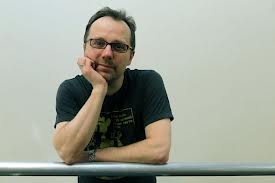|
Symphony
FROM THE NEW WORLD TO THE OLD WORLD
by Peter Lert
Saturday, June 14, 2025
Chamber
MC2 DUO RECITAL CLOSES 222'S SEASON
by Terry McNeill
Saturday, June 14, 2025
Choral and Vocal
CANTIAMO SONOMA'S LUSCIOUS A CAPELLA SINGING IN SEASON ENDING CONCERT
by Pamela Hicks Gailey
Sunday, June 8, 2025
Symphony
SRS SEASON ENDS WITH RESOUNDING TA-TA-TA-BANG
by Terry McNeill
Sunday, June 1, 2025
Symphony
YOUTHFUL VIRTUOSITY ON DISPLAY AT USO'S MAY CONCERTS
by Peter Lert
Saturday, May 17, 2025
Symphony
MYSTICAL PLANETS AND LIVELY GERSHWIN ORTIZ AT FINAL SRS CONCERT
by Peter Lert
Sunday, May 4, 2025
Symphony
VSO'S CONCERT MUSIC OF TIME, MUSIC OF PLACE
by Peter Lert
Sunday, April 27, 2025
VOCAL ELEGANCE AND FIRE AT THE 222'S RECITAL APRIL 26
by Pamela Hicks Gailey
Saturday, April 26, 2025
CANTIAMO SONOMA SINGS AN INSPIRED GOOD FRIDAY MOZART REQUIEM CONCERT
by Pamela Hicks Gailey
Friday, April 18, 2025
DRAMATIC SHOSTAKOVICH SYMPHONY CLOSES PHILHARMONIC'S 25TH SEASON
by Terry McNeill
Sunday, April 13, 2025
|
 |
 Violinist and Composer Mark Volkert |
PANDORA A BOX OF SONIC DELIGHTS AT FIRST SF SYMPHONY CONCERT IN WEILL
by Terry McNeill
Thursday, December 6, 2012
In what must be the fall season’s last blockbuster Green Music Center concert, the San Francisco Symphony played a long awaited program Dec. 6 to an almost full Weill Hall audience.There was a palpable excitement when concertmaster Alexander Barantchik and then conductor Michael Tilson Thomas entered and happily acknowledged loud applause from the assembly and standing orchestra members.
The first half was extraordinary, a champagne orgy of orchestral sound that began with Strauss’ early Op. 28 tone poem Til Eulenspiegel’s Merry Pranks. String attacks and releases were impeccable and the violins and violas had a deep cohesive sound, playing off the wonderful horn parts. The trombones were brassy and sounded as one. Mr. Barantschik’s solo passages, including a delicious long descending scale midway in the boisterous composition, were virtuosic. William Bennett’s oboe playing was soulful and gracefully imitated a languorous human voice.
Mr. Thomas’ control of the interplay of instrumental sections, especially at low volume levels, was masterful.
Associate Concertmaster Mark Volkert stepped into the composer’s role before the halftime break as his orchestra played Pandora, an amazing twenty-three minute display piece for strings alone. The world premiere was the previous evening. Mr. Thomas provided introductory remarks for the work’s mythological origins and the Symphony launched into a mysterious introductory section of high violin sound. Solo passages were subsequently handed around, beginning with elegant playing by bassist Scott Pingel, cellist Peter Wyrick and ultimately an enchanting duo from Mr. Barantschik and stand partner Jeremy Constant. The conductor was able to balance the two lyrical sections and impetuous outbursts to telling effect. It was a brilliant antidote to the opulent harmonies of Strauss’ Til.
During this vehement but never violent piece the composer inserted intriguing effects, making a violin chirp like a flute and a horn part to resemble, albeit for a just moment, percussion sounds. Overall, there is an underlying menace to the writing and just a hint of Bartok’s pungent rhythms and Shostakovich’s sarcasm. The solo violin cadenza was deftly dispatched by Mr. Barantschik and another string duo, played by Mr. Wyrick and cellist Amos Yang, was beguiling.
Mr. Volkert is clearly a sovereign writer for strings and the performance was for me the evening’s highlight. Though long for a modern all-string composition, it merits joining the Orchestra’s repertoire.
Following intermission pianist Yefim Bronfman played Beethoven’s Fifth Concerto in E Flat, Op. 73. Known as the “Emperor” Concerto, the work abounds in mighty statements for soloist and orchestra and the music throughout commands a visceral potency. Mr. Bronfman gave a curious reading, patrician in concept but devoid of majesty or interest. His scales rippled and his fingers were faultless, but the phrasing was constantly square and heroics, inner voices and left-hand dynamic power were absent. It was irritatingly conventional, monochromatic and careful throughout.
The Orchestra played the concerto well in a low-voltage way, matching their sound to the soloist’s restrained interpretation. A standing ovation ensued.
|
